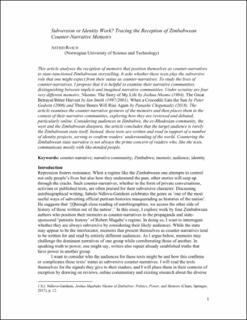| dc.contributor.author | Rasch, Astrid | |
| dc.date.accessioned | 2022-01-06T07:31:41Z | |
| dc.date.available | 2022-01-06T07:31:41Z | |
| dc.date.created | 2021-08-05T14:30:03Z | |
| dc.date.issued | 2021 | |
| dc.identifier.citation | Journal of Southern African Studies. 2021, 47 (5), 817-834. | en_US |
| dc.identifier.issn | 0305-7070 | |
| dc.identifier.uri | https://hdl.handle.net/11250/2836272 | |
| dc.description.abstract | This article analyses the reception of memoirs that position themselves as counter-narratives to state-sanctioned Zimbabwean storytelling. It asks whether these texts play the subversive role that one might expect from their status as counter-narratives. To study the lives of counter-narratives, I propose that it is helpful to examine their narrative communities, distinguishing between implicit and imagined narrative communities. Under scrutiny are four very different memoirs: Nkomo: The Story of My Life by Joshua Nkomo (1984), The Great Betrayal/Bitter Harvest by Ian Smith (1997/2001), When a Crocodile Eats the Sun by Peter Godwin (2006) and These Bones Will Rise Again by Panashe Chigumadzi (2018). The article examines the counter-narrative gestures of the memoirs and then places them in the context of their narrative communities, exploring how they are reviewed and debated, particularly online. Considering audiences in Zimbabwe, the ex-Rhodesian community, the west and the Zimbabwean diaspora, the article concludes that the target audience is rarely the Zimbabwean state itself. Instead, these texts are written and read in support of a number of identity projects, serving to confirm readers’ understanding of the world. Countering the Zimbabwean state narrative is not always the prime concern of readers who, like the texts, communicate mostly with like-minded people. | en_US |
| dc.language.iso | eng | en_US |
| dc.publisher | Routledge | en_US |
| dc.rights | Navngivelse-Ikkekommersiell 4.0 Internasjonal | * |
| dc.rights.uri | http://creativecommons.org/licenses/by-nc/4.0/deed.no | * |
| dc.title | Subversion or Identity Work? Tracing the Reception of Zimbabwean Counter-Narrative Memoirs | en_US |
| dc.type | Peer reviewed | en_US |
| dc.type | Journal article | en_US |
| dc.description.version | acceptedVersion | en_US |
| dc.source.pagenumber | 817-834 | en_US |
| dc.source.volume | 47 | en_US |
| dc.source.journal | Journal of Southern African Studies | en_US |
| dc.source.issue | 5 | en_US |
| dc.identifier.doi | 10.1080/03057070.2021.1964208 | |
| dc.identifier.cristin | 1924169 | |
| dc.relation.project | NOS-HS (Nordisk samarbeidsnemnd for humanistisk og samfunnsvitenskapelig forskning): 2018-00057/NOS-HS_3 | en_US |
| dc.description.localcode | This is an Accepted Manuscript of a book chapter published by Routledge. Locked until 20/3-2023 due to copyright restrictions. Available online: http://dx.doi.org/10.1080/03057070.2021.1964208 | en_US |
| cristin.ispublished | true | |
| cristin.fulltext | postprint | |
| cristin.qualitycode | 1 | |

